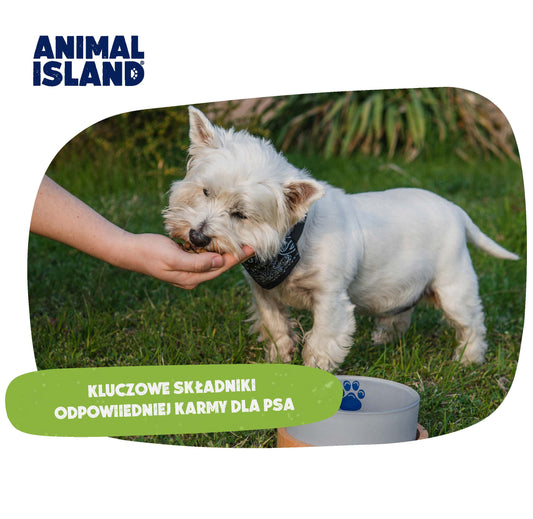The best dog food

Choosing the best dog food is very important for your dog's health and overall well-being. Proper nutrition for your pooch is also crucial for its long life.
Therefore, whenever possible, it is best to consult your dog's nutrition with their breeder, who has detailed knowledge of the breed's specific nutritional needs and the animal's nutritional history since birth. If you do not have access to a breeder, it is recommended to seek advice from a veterinarian.

Your veterinarian will recommend an appropriate diet based on their knowledge and assessment of your dog's health. Proper nutrition is key to your dog's healthy development, both physically and mentally.
Why is food choice so important?
When choosing food, what are you really deciding about? First and foremost, the nutrients you will provide your dog. Every dog requires a rich set of proteins, fats, vitamins and minerals, which only the best food can provide.
Proteins help your dog grow and maintain strong muscles, fats provide energy, and vitamins and minerals support the function of all key organs. We don't realize it, but food has a huge impact on many aspects of a dog's life, from the appearance of its coat, to its mood, to its overall health.

Inappropriate food can lead to problems with excess weight, allergies or digestive problems. That is why it is so important to always choose the highest quality products. When choosing food for your dog, always pay attention to the composition and origin of the ingredients. It is worth considering whether your pet will be suitable for dry or wet food.
Every dog is different and therefore has different needs. Matching your dog's food to their individual needs will help them live a long, healthy and happy life.
Good feeding practices for your dog
You already understand how important it is to feed your dog the right food. However, good feeding practices are just as important and also affect the health and well-being of your pet.
Regular meals
Just like humans, dogs also respond well to regular meals. Create a meal schedule for your dog and try to stick to it as regularly as possible. Regular feeding helps maintain stable blood sugar levels and prevents overfeeding.
Moderation in rewarding
When training and playing with your pet, it is easy to forget about moderation when giving rewards in the form of treats. However, remember that they can significantly increase your dog's daily calorie intake and ultimately lead to obesity.
Hydration
As with food, your dog should always have access to fresh, clean water. Remember that wet food can only provide a portion of the hydration your dog needs. Dogs that are more active or exposed to heat may require more water than usual.
Rules for selecting food for an adult dog
Choosing the right food for an adult dog depends on many factors, such as breed, age, physical activity, health, and even taste preferences of the dog. We wrote about how important this choice is in the previous paragraphs. Now we will focus on the principles of choosing the right food for an adult dog.
Size and breed of dog
Miniature and giant dog breeds have completely different nutritional needs. Small dogs often need food with a higher energy density because they have a faster metabolism. Large dogs, on the other hand, tend to have joint and digestive problems, so they require food specially prepared for them.
Physical activity
Dogs that are very active require a high-energy diet. Less active dogs should be given a low-calorie diet to prevent weight gain.
Health condition
If your dog has any medical conditions, such as food allergies, kidney disease, or digestive problems, they may have special dietary requirements. In this case, it is best to consult your veterinarian to help you choose the right diet.
Dog's taste preferences
Finally, remember that your dog, just like you, has his or her own taste preferences. While you may take your health and nutrition very seriously, if your dog doesn’t like the food you choose, all your efforts may be in vain. That’s why it’s worth paying attention to your pet’s taste preferences. After all, who knows them better than you!
When to change your senior dog’s food?
Your dog's nutritional needs change as they age. As your companion ages, their metabolism slows down and their appetite may gradually decrease. That's why it's worth considering changing their food to one that's designed for older dogs.
The first step in figuring out when to change your senior dog’s food is to consider his age. For most dogs, “seniority” begins around age seven, although small breeds age a bit slower. Some dogs may need a change in diet sooner, especially if they have health issues like obesity, dental disease or digestive problems.

A good senior dog food is usually low in calories, high in protein, and easily digestible. This food may also contain nutrients that support joint, heart, and brain health. When choosing, it is always important to consult your veterinarian to make sure the food is right for your senior dog.
Buying the right food for your senior dog is not everything - it is also important to change the way you serve meals. For example, you can divide the food into several smaller doses given during the day to minimize the load on your dog's digestive system.
Common mistakes made by owners when choosing food
Your dog deserves the best care possible, and that starts with the food you feed him. Unfortunately, there are some mistakes that many dog owners make, so we’ll try to explain them here.
Choosing food based on price
It’s no secret that some dog food brands are cheaper than others. However, the price usually reflects the quality of the ingredients. Cheaper-made dog food can often contain low-quality ingredients, such as meat or grain waste. So when choosing dog food for your dog, remember that quality is more important than price.
Lack of understanding of food composition
The list of ingredients in a dog food may seem complicated at first glance. However, to ensure that your pet receives the highest quality food possible, it is worth taking the time to understand all of these terms. If you see a lot of unfamiliar terms on the food label, it is likely not a good choice for your dog.
Switching to another food
too soon Dogs, like people, can suffer from stomach problems if their diet changes too suddenly. If you are going to change your dog's food, do it gradually, increasing the amount of the new food in his diet each day.
Frequently asked questions
How to check if dog food is good?
Checking whether your dog food is good doesn't have to be complicated. First of all, it's worth paying attention to the composition of the food. High-quality food should contain mainly meat, not cheap fillers such as grains or soy. Meat should be the first ingredient on the list. Its percentage in the composition, quality and origin also matter.
Additionally, check if the food does not contain artificial preservatives, colors and flavors. Avoid foods that contain "meat and animal products" - such a composition may mean that the food contains various low-quality animal residues.
The second step is to observe your dog. Does he have diarrhea after eating the food, is he restless? Is he sleepy and apathetic after eating? Does he have weight problems? Anything that negatively affects your dog's mood and well-being may be a sign that the food you are using is not right for him.
Finally, remember that good food will also be confirmed by other sources. Check out the opinions of other dog owners, seek advice from nutritionists, and if in doubt, consult your vet.

















